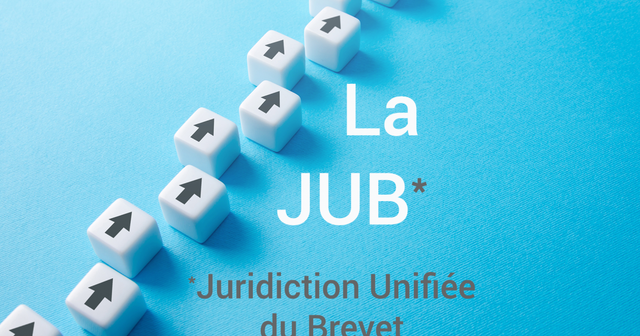
Actualités
Inscrivez-vous à notre newsletter mensuelle, pour ne pas manquer les conseils de nos experts, nos webinaires et l'actualité dédiés à la Propriété Intellectuelle.
Recherche
- Article
- Blog | Flash infos
- Webinaire
- Livre blanc
- Témoignage
- Événement
Ressources (1083)
 La marque de couleur : une protection rare mais recherchéeMarques, dessins et modèlesÀ la suite du refus d’une demande d’enregistrement de marque de couleur déposée par la société allemande de construction Weischer GmbH, Colombe Dougnac donne des conseils pour établir le caractère dis...Lire la suite
La marque de couleur : une protection rare mais recherchéeMarques, dessins et modèlesÀ la suite du refus d’une demande d’enregistrement de marque de couleur déposée par la société allemande de construction Weischer GmbH, Colombe Dougnac donne des conseils pour établir le caractère dis...Lire la suite De l’exécution forcée des décisions de l’INPI et de l’EUIPOMarques, dessins et modèlesLes décisions de l’EUIPO, ainsi que les décisions de l’INPI en matière de déchéance et de nullité peuvent comporter des dispositions condamnant la partie perdante à prendre à sa charge les frais expos...Lire la suite
De l’exécution forcée des décisions de l’INPI et de l’EUIPOMarques, dessins et modèlesLes décisions de l’EUIPO, ainsi que les décisions de l’INPI en matière de déchéance et de nullité peuvent comporter des dispositions condamnant la partie perdante à prendre à sa charge les frais expos...Lire la suite Quand la lenteur judiciaire menace le droit de propriété sur une marqueMarques, dessins et modèlesEn tant que juriste, il nous arrive d’être confrontés à une situation critique lorsque la solution « juste » paraît évidente, mais que le texte de loi ne permet pas forcément d’y parvenir. Il est alor...Lire la suite
Quand la lenteur judiciaire menace le droit de propriété sur une marqueMarques, dessins et modèlesEn tant que juriste, il nous arrive d’être confrontés à une situation critique lorsque la solution « juste » paraît évidente, mais que le texte de loi ne permet pas forcément d’y parvenir. Il est alor...Lire la suite- Blog | Flash infos[Blog] Suisse : Procédure accélérée en matière de nullitéDepuis le 9 décembre 2025, la Suisse accélère les actions en nullité liées à la contrefaçon : décision attendue en un an maximum, sans audience d’instruction et avec des délais strictement encadrés. U...Lire la suite
- Blog | Flash infos[Blog] Extension de l’utilisation de l’IA pour la rédaction des procès-verbaux de procédures orales à l’OEBDepuis mai 2025, environ 150 procédures orales ont été conduites dans le cadre d’un projet pilote visant à assister la rédaction des procès-verbaux au moyen d’outils d’intelligence artificielle. À la ...Lire la suite
- Blog | Flash infos[Blog] L'ICANN sévit contre les Registrars défaillantsICANN renforce la discipline début 2026 : résiliation du registrar hongkongais 0101 Internet pour impayés et défaut de migration RDAP, mise en demeure de MainReg Inc., dont près de la moitié des domai...Lire la suite
 Client-attorney privilege en matière de brevets : portée, limites et bonnes pratiquesBrevetsFace à la multiplication des litiges internationaux en matière de brevets, les entreprises européennes sont de plus en plus exposées aux procédures de discovery, notamment aux États-Unis. Dans ce cont...Lire la suite
Client-attorney privilege en matière de brevets : portée, limites et bonnes pratiquesBrevetsFace à la multiplication des litiges internationaux en matière de brevets, les entreprises européennes sont de plus en plus exposées aux procédures de discovery, notamment aux États-Unis. Dans ce cont...Lire la suite Réforme du programme PACE de l’OEB : quels impacts pour votre stratégie brevets ?BrevetsÀ compter du 1er février 2026, de nouvelles règles sont entrées en vigueur pour les demandeurs de brevets utilisant le programme PACE de l’Office européen des brevets (OEB). Marion Bénetière explique ...Lire la suite
Réforme du programme PACE de l’OEB : quels impacts pour votre stratégie brevets ?BrevetsÀ compter du 1er février 2026, de nouvelles règles sont entrées en vigueur pour les demandeurs de brevets utilisant le programme PACE de l’Office européen des brevets (OEB). Marion Bénetière explique ...Lire la suite Protection de marque et tendance marketing : La décision 'Quite Luxury’Marques, dessins et modèlesLes concepts commerciaux, comme le « quiet luxury », peuvent facilement captiver l’imagination du public, mais cela ne signifie pas qu’ils puissent être enregistrés en tant que marques, explique Laeti...Lire la suite
Protection de marque et tendance marketing : La décision 'Quite Luxury’Marques, dessins et modèlesLes concepts commerciaux, comme le « quiet luxury », peuvent facilement captiver l’imagination du public, mais cela ne signifie pas qu’ils puissent être enregistrés en tant que marques, explique Laeti...Lire la suite- Blog | Flash infosDécision Cassation Addictions France c. BEER MARKET « LA LEVRETTE »Quand la morale tente de faire la loi : la Cour de cassation rappelle que la règle juridique prime ! Dans la continuité de notre article Rébellion mousseuseLire la suite
 La feuille de route de la juridiction unifiée du brevet (JUB)BrevetsL’entrée en vigueur de l’accord de la JUB est actuellement prévu pour le 1er avril 2023. Vous trouverez dans cet article nos publications pour suivre en temps réel la feuille de route de la juridictio...Lire la suite
La feuille de route de la juridiction unifiée du brevet (JUB)BrevetsL’entrée en vigueur de l’accord de la JUB est actuellement prévu pour le 1er avril 2023. Vous trouverez dans cet article nos publications pour suivre en temps réel la feuille de route de la juridictio...Lire la suite- Blog | Flash infosTechnologies quantiques : l’OEB et l’OCDE dressent un état des lieux mondial de l’innovation brevetéel’Office européen des brevets (OEB) et l’Organisation de coopération et de développement économiques (OCDE) proposent une cartographie de l’écosystème mondial des technologies quantiques.Lire la suite
 Guide d’introduction à la propriété intellectuelle pour le secteur du jeu vidéoDroits d'auteur ,Marques, dessins et modèlesDe nombreux spécialistes ne prennent pas en compte la propriété intellectuelle lors de la création de nouveaux jeux, alors qu’elle joue un rôle essentiel dans la protection de la créativité. Alban Rad...Lire la suite
Guide d’introduction à la propriété intellectuelle pour le secteur du jeu vidéoDroits d'auteur ,Marques, dessins et modèlesDe nombreux spécialistes ne prennent pas en compte la propriété intellectuelle lors de la création de nouveaux jeux, alors qu’elle joue un rôle essentiel dans la protection de la créativité. Alban Rad...Lire la suite- Blog | Flash infosFuture augmentation des taxes officielles par l’Office eurasien des brevetsA partir du 1er février 2026, les taxes officielles pour les demandes de brevets, les brevets, ainsi que les dessins et modèles vont augmenter devant l’Office eurasien des brevetsLire la suite
- Blog | Flash infosUn signe trop simple pour être enregistréDans sa décision du 16 janvier 2026, l’EUIPO a confirmé le refus pour défaut de caractère distinctif de la demande de marque figurative n° 019245446 représentant « un trait simple » ou une « forme fig...Lire la suite
- Blog | Flash infos82 000 contrefaçons de parfums saisies lors d’une opération « FRAGRANCE »La Douane française, la DGCCRF et les agents d’administrations partenaires ont organisé une opération spéciale «FRAGRANCE» du 12 au 19 novembre 2025, avant les fêtes de fin d’année.Lire la suite
- Blog | Flash infosCRAVE NO MORE : un slogan publicitaire qui réclame plus de distinctivitéLe Tribunal de l’Union Européenne a confirmé le refus de l’EUIPO pour défaut de caractère distinctif de la marque figurative CRAVE NO MORE en classes 1, 5, 29, 30 et 32 (désignant notamment les extrai...Lire la suite
 La protection des dessins et modèles à l'épreuve de la « fast fashion »Marques, dessins et modèlesDans un arrêt du 18 décembre 2025 (Deity Shoes, S.L. c/ Mundorama Confort, S.L. et al., aff. C-323/24), la Cour de justice de l’Union européenne précise les notions de création et de caractère individ...Lire la suite
La protection des dessins et modèles à l'épreuve de la « fast fashion »Marques, dessins et modèlesDans un arrêt du 18 décembre 2025 (Deity Shoes, S.L. c/ Mundorama Confort, S.L. et al., aff. C-323/24), la Cour de justice de l’Union européenne précise les notions de création et de caractère individ...Lire la suite JUB : clés d’analyse de l’activité inventiveBrevetsSylvain Dubois analyse deux arrêts clés rendus le 25 novembre 2025 par la Cour d’appel de la JUB, Meril v Edwards et Amgen v Sanofi/Regeneron, qui consacrent une approche désormais structurée et « glo...Lire la suite
JUB : clés d’analyse de l’activité inventiveBrevetsSylvain Dubois analyse deux arrêts clés rendus le 25 novembre 2025 par la Cour d’appel de la JUB, Meril v Edwards et Amgen v Sanofi/Regeneron, qui consacrent une approche désormais structurée et « glo...Lire la suite- Blog | Flash infosWhatsApp, nouveau terrain d’atteintes aux droits de marqueSelon l’Autorité des marchés financiers, près de 1,5 million de Français ont été victimes d’arnaques financières en 2024, et plus de 6,8 millions de comptes WhatsApp liés à des fraudes en tout genre o...Lire la suite